





- Confessions of a Librarian
- First research in my own library
- Renewed research in the library "Altes Buch"
- Research of a manuscript
- Researching the history of my own namesake
- Proverbs – then and now: research in the library
- What Aventine said about Bavarians
- Research on Christmas: A Christmas Quote from Augustine
- About the creation of the myth of Pope Joan
Confessions of a Librarian
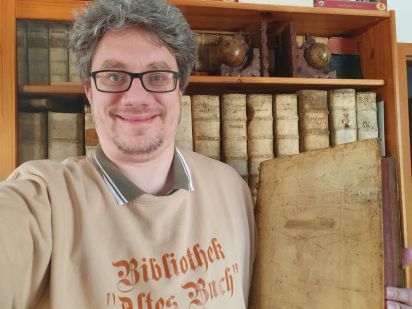
I was recently asked what my old books mean to me. There are many aspects that are important to me:
Mostly, it's the fascination that makes these old books so special. They come from a time to which we cannot even set back our memories. For example, very few of us can retrace their ancestors back to these times. Silent witnesses of a long-ago past that have much to tell: Of wars, suffering, and pain. Who held them in their hands and what did they go through? Furthermore, the covers also tell their own unique story: Who bought the book first? How rich were they? What kind of bindings could they afford? The engravings depicted in old books are also works of art, created by an artist over hours of painstaking work.
Ultimately, these books are always something special. It gives me great joy every time I hold one of them in my hands.
First research in my own library
We heard about the "Testimonium Flavianum" in a theology lecture about Jesus: [Link]
Today I received the book by the author of this "Testimonium" (Flavius Josephus) in the Strasbourg first edition (German translation) from the year 1574, which, by instance I got offered by a dealer, just while studying for the exam, which was on Feb. 2nd, 2021 (let's call it "Divine Guidance"). So of course I had to open the mentioned passage, the "Testimonium" itself (first paragraph in the picture): "[DE] Es hat auch zur selbigen zeit gelebt […] ":
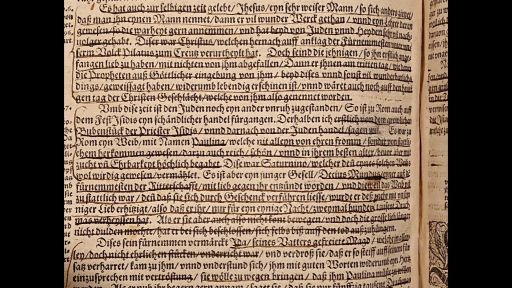
Then I read the Wikipedia article more closely and came across Hieronymus in the "sources": [DE] [Link]
Zitat:
[DE] Neben Eusebius' Kirchengeschichte ist Hieronymus' Werk "Berühmte Männer" (De viris illustribus) das zweite Werk, das in der Rezeptionsgeschichte des Testimonium Flavianum wichtig war. Hieronymus übersetzte die Passage um 392 sehr wörtlich vom Griechischen ins Lateinische, aber mit einer Abweichung. In De viris illustribus 13,16,15 schrieb er statt hic erat Christus ("Dieser war der Christus") credebatur esse Christus ("man glaubte, er sei der Christus"). De viris illustribus ist in Handschriften des 6. und 7. Jahrhunderts erhalten, Manuskripten, die deutlich älter sind als jene, die man für Josephus' Antiquitates oder Eusebius' Kirchengeschichte zur Verfügung hat. Auch die syrische Weltchronik Michaels des Syrers bietet diese Formulierung: "man glaubte, er sei der Christus". Da lateinische und syrische Theologen wegen der konfessionellen Spaltungen der Spätantike ihre Werke gegenseitig nicht lasen, scheint hier wie dort eine griechische Version des Testimonium Flavianum vorgelegen zu haben, die diese Formulierung enthielt.
Then it occurred to me: Hieronymus, whose "Opera Omnia" in the Cologne edition from 1616, I also have that in my own bookshelf: [Link]
So I had to see if the work mentioned here "De viris illustribus" (Famous men) was in there, too. And I really found what I was looking for: In the first part of the "Opera Omnia" the work mentioned was actually listed. It says (this is the quote from the "Testimonium Flavianum"): "Scripsit autem de Domino in hunc modum: […]" (However, he wrote about the gentleman as follows: […])…
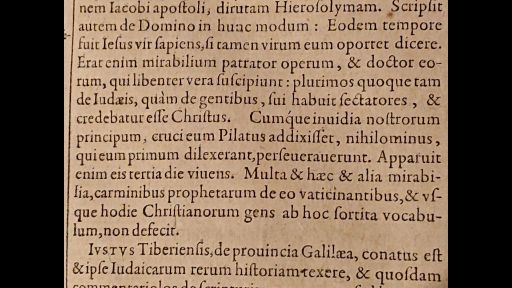
Then, I kept on looking at the sources: [Link]
Quote:
[DE] Pseudo-Hegesippus Schrift "Der Untergang Jerusalems" De excidio Hierosolymitano (4. Jahrhundert) ist eine freie lateinische Paraphrase von Josephus’ Schrift über den Jüdischen Krieg mit antijüdischer Tendenz, angereichert durch Abschnitte aus Josephus’ Antiquitates, darunter auch das Testimonium Flavianum. Dabei lässt Pseudo-Hegesippus aber die Formulierung "Dieser war der Christus" aus.[23] Dies ist wichtig, weil aus dem Zusammenhang klar ist, dass der Autor eine Abschrift der Antiquitates vorliegen hat und nicht Eusebius oder sonst einen Kirchenschriftsteller.
Then I noticed that the Flavius Josephus that I received today had Hegesippus attached [Link]. So I had to check if this was the said work ("Der Untergang Jerusalems"), so I looked for the quote used in the Wikipedia article ("Der Untergang Jerusalems", Book 2, Chapter 12): Also I found what I was looking for: [DE] "Dan der Geschichtschreiber Josephus sagt […]".
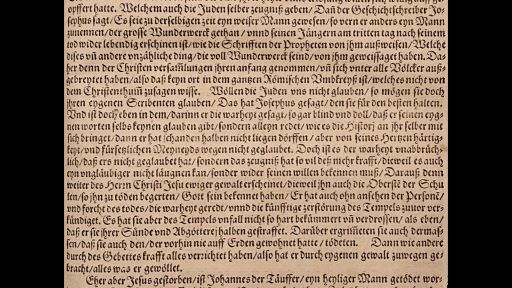
You won't believe how proud it makes me to be able to do such "research" in my own library of "old books". I hear something in the religion class, and then I can study the original sources in my own library. It has the charm, the flair of an old monastery library like the one in the movie "The Name of the Rose". I thought for a long time: "What is my dream in life?" I think one of these "dreams" has really come true with this. Running this "old library" is not a "shopping addiction" but a hobby, a real passion. I hope you can understand that to some extent, also based on this explanation. It has now also encouraged me to continue pursuing this hobby, to continue working on it (digitizing books, and so on).
Renewed research in the library "Altes Buch"
After I did this first research, which I have already reported on, I managed to do another research:
In the "Augustinus" lecture as part of my master's degree on Wednesday, January 12th, 2022, I heard that Augustine indirectly quoted Virgil's Aeneid at the end of his work "De Civitate Dei" (on the citizenship of God) when he quotes Aeneas' father, Anchises, as saying:
You Romans, remember this to rule peoples, this will be your skill: to order the peace, to spare the subdued and to make war on the arrogant.
[Vergil: Aeneis 6, 850-853], available on my quotation page: [Link]
With that he took a stand and said that this Roman lust for power cannot be permanent since it is earthly. This is what Augustine writes in "De Civitate Dei" towards the end, as a kind of final conclusion:
[…]"It is not for you to know the times which the Father has set in his own power." At the end of this age, too, God will rest on the seventh day, in that he will let this very day that we are, rest in himself. To deal here in more detail with these individual ages would lead too far; but this seventh age will be our Sabbath, the end of which will not be evening, but as the eternal eighth day the day of the Lord, sanctified by Christ's resurrection, and representative of the rest not only of spirit but also of body. We will celebrate and look, look and love, love and praise. Yes verily it will be so without end at the end. Because that is our ultimate goal, to reach a kingdom that has no goal set by an end.
[Augustinus, Aurelius: "De Civitate Dei", Buch XXII], also available on my quotation page: [Link]
Since I personally own "De Civitate Dei", it was easy for me to find the right position:
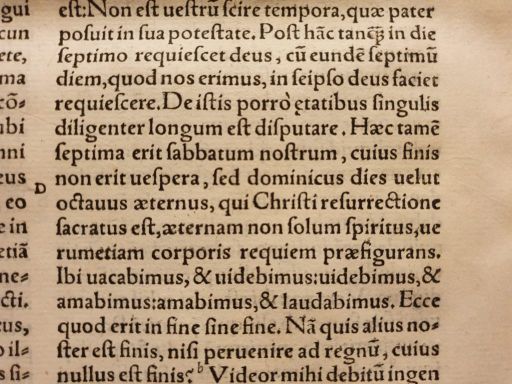
The quote is at the following location: "Non est vestru scire tempora, quae […]"
Not only do I own the book "De Civitate Dei" in a version from 1555 [Link], but it also occurred to me that I had recently read Virgil with his "Opera omnia" in the Lyon version of 1550 [Link]. Among other things, the "Aeneid" can also be found there.
The passage mentioned above can be found on page 285 of the book:
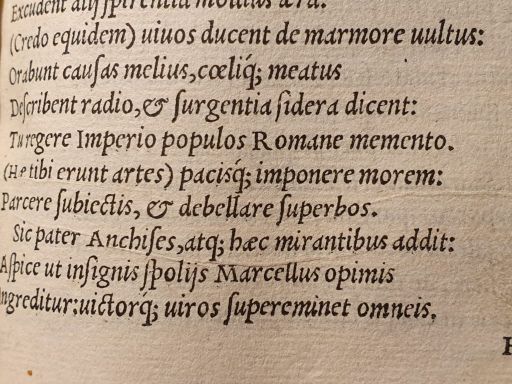
Starting at: "Tu regere Imperio populos Romane memento."
It is impressive to be able to read about these passages in the original sources from the middle of the 16th century, in books some of which are more than 400 years old. It feels like I'm a student of the time studying these works in a monastery library.
I'll keep you posted as more research takes place in my library "Altes Buch".
Research of a manuscript
I discovered in an old Bible from 1661, which I had bought that there an old parchment manuscript from the late medieval times was used as flyleaf (waste). In the back, as well as in the front such parchment was added.
I started to discover the front parchment and tried to find out, what the text was about. Therefore, I had to google for some passages which I could decipher to find out what source it actually was. Then, I found that link:
www.monumenta.ch [Link]
[Augustinus, Aurelius: In Ioannis Evangelium Tractatus CXXIV, 24, 3] [DE]
There it reads:
…[ten]tabat, nisi quia ignorantiam discipuli demonstrabat? Et forte in demonstratione ignorantiae discipuli aliquid significavit. Apparebit ergo, cum ipsum sacramentum de quinque panibus coeperit nobis loqui, et quid significet indicare: ibi enim videbimus quare Dominus in hoc facto ignorantiam discipuli voluit interrogando quod sciebat, ostendere.
[Augustinus, Aurelius: In Ioannis Evangelium Tractatus CXXIV, 24, 3]
That was exactly that passage, which was found on the first paragraph of that manuscript:
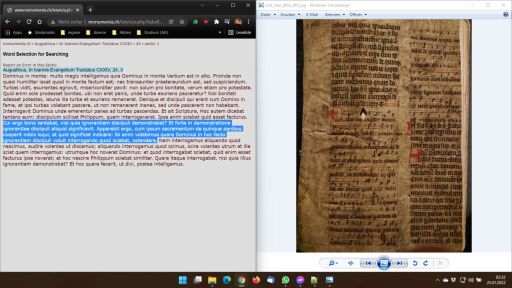
Comparison of that text: From: Augustinus, Aurelius: In Ioannis Evangelium Tractatus CXXIV, 24, 3
So I thougt to look about that quote in my recently bought "Opera" of St. Augustine in his Paris edition from 1649-54, to find out if I can find it on that place. Indeed: In Tomus IX of his Opera there is the "Expositiones Augustini in Evangelium Iohannis". After a small adjustment I found that passage (Tractatus 24,3):
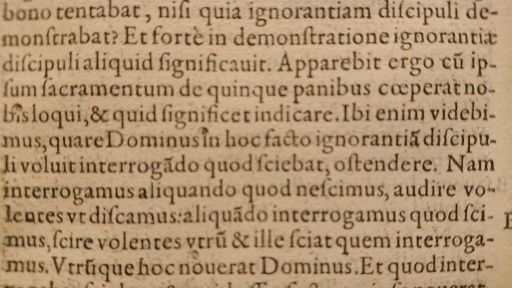
S. Avrelii Avgvstini Hipponensis episcopi Opera tomis vndecim comprehensa [Tomus 9]: Expositiones […] in Novum Testamentum, p. 87.
Really impressive, how such researches can be made. Unfortunately, you cannot really date the old manuscript itself. But, as mentioned above, it is probably a manuscript of late medieval times (assumingly 14th/15th century). That's what my sense and sensibilty tells me.
Researching the history of my own namesake
Often you found out something new, when you have as many books as I have in your own library. So I discovered the history of my own namesake in the Aventine's Chronicle (Johannis Auentini Des Hochgelerten weitberümbten Beyerischen Geschichtschreibers Chronica, Frankfurt, 1580):
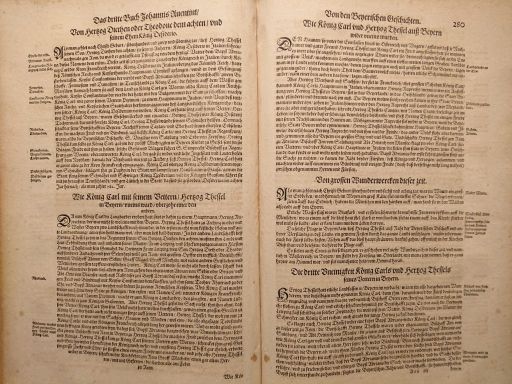
Johannis Auentini Des Hochgelerten weitberümbten Beyerischen Geschichtschreibers Chronica, pp 280
There it reads:
Wie König Carl mit seinem Vettern / Herzog Thessel in Bayern / uneins ward / uberzohe einer den andern.
[Johannis Auentini Des Hochgelerten weitberümbten Beyerischen Geschichtschreibers Chronica, Frankfurt, 1580, pp 280.]
Here, you have to mention that "Herzog Thessel" is Tassilo III, and "König Carl" (king Karl) is noone else but Charlemagne himself. It was at a time when Charlemagne was not yet crowned as emperor, and the quarrels culminated in intrigues, which Charlemagne expressed to Tassilo, because he was getting too powerful for him and he saw his claim to rule in danger. So he was able to get rid of Tassilo and send him into exile after convicting him in a show trial. However, he feared the vengeance of the people so much that he could not bring himself to actually sentence Tassilo to death in the show trial that was held against him, for Tassilo himself was very popular.
Then, I made a further research in my own library and found something else:
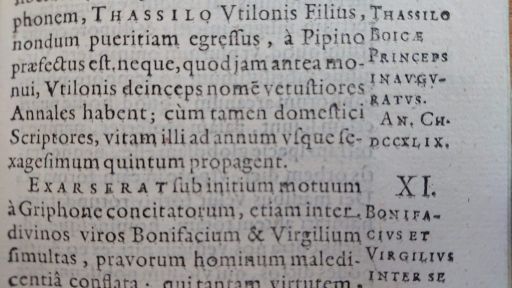
Brunner, Andreas: Annalium Virtutis Et Fortunae Boiorum [Tomus 1], p. 687
In the books "Annalium Virtutis Et Fortunae Boiorum" [Tomus 1] written by Andreas Brunner, written in 1626, T[h]assilo's life is documented much more intense (in latin language). So, in the year 744 he was proclaimed "princeps boicae" (Soverain of Boier), like it is shown in the picture above. In the same book, at page 667, we can read that T[h]assilo was born in the year 742. I am going to read more of that latin text of my namesake in that book. These are the last pages of that first part of the "Annales Boiorum" from Andreas Brunner, containing 735 pages.
Some more facts about Tassilo III:
He would have made it to unify the bavarian people, both Franconians and Bajuvarians, if Charlemagne had not kept him apart from doing it. That was, because Tassilo was a decendant from both tribes, like you can read at Aventine. That is what makes the story really interesting.
The sad thing about that story is that the victim of that intrigues, Tassilo III, is not yet canonized, while Charlemagne, despite these evil deeds is worshiped as a saint. But that is how the catholic chirch really is. But you have to mention that the canonization of Charlemagne was made by an "antipope", Paschal III (Guido of Crema) in the year 1165. You can read about that at the Wikipedia Article of Charlemagne.
That is an example of another interesting exploration, that can be made from time to time in my library "Altes Buch".
Proverbs – then and now: research in the library
I recently bought a new book which has got an interesting content. It is a collection of german proverbs written by Sebastian Franck: "Sprichworter, schöne, weise Klugreden: darinnen Teutscher unnd anderer Spraachen Höfflicheit, Zier, Höchste Vernunfft unnd Klugheyt". Frankfurt, 1565.
There you can find some really interesting proverbs that are still in use in modern german language. For example, let's take a look at the first page of that register:
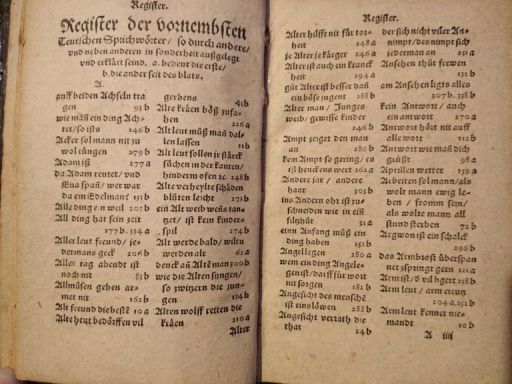
Franck, Sebastian: Sprichworter, schöne, weise Klugreden. Register, page 1
For example, there you can find following proverbs on the first page of that register that are still very common today:
- [DE] Aller tag abendt ist noch nit (Es ist noch nicht aller Tage Abend.)
- [DE] Alter hülfft nit für torheit (Alter schützt vor Torheit nicht.)
- [DE] kein Antwort/ auch ein antwort (Keine Antwort ist auch eine Antwort.)
- [DE] Aprillen wetter (Aprilwetter)
- [DE] Arbeiten sol mann/ als wolt mann ewig leben/ fromm sein/ als wolte mann all stund sterben (Arbeiten, als ob man ewig lebt, und fromm sein, als müsse man sofort sterben)
These are only the proverbs listed on the first page of that register. On my homepage I listed two other proverbs in my collection of quotes:
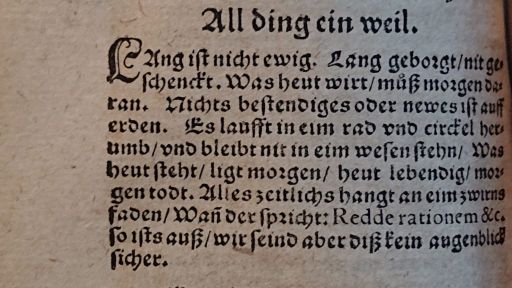
[DE] All ding ein weil (Good things take time.)
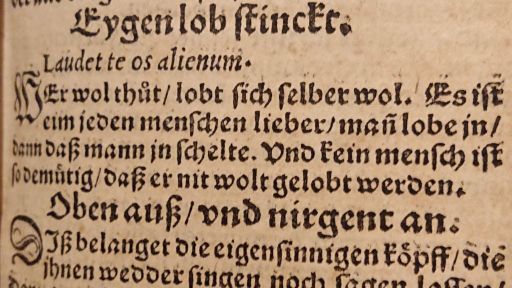
[DE] Eygen lob stinckt (Self-praise stinks.)
These two quotes are still very popular, even today. Amazing how these proverbs survived for almost 500 years now.
What Aventine said about Bavarians
On taking a look at my pictures that I had on my PC, i found that picture:

Aventine about Bavarians. Source: unknown
Then, it came to my mind, that the Chronicle of Aventine already stood in my bookshelf for a couple of months. Therefore I was willing to read about that quote there by myself. But there was a problem: The Book, my signature cod_pri_072, written in the year 1580, had almost 500 pages. So where to start reading?
Therefore I made a research in the internet first, and learned about that homepage: "Zitate und Anekdoten", where that quote of Aventine could be found:
[DE] "Das baierisch volk, gemainlich davon zu reden, ist geistlich schlecht und gerecht, get, läuft gern kirchferten, hat auch vil kirchfart; legt sich mer auf den ackerpau und das viech dan auf die krieg, denen es nicht fast nachläuft, trinkt ser, macht vil kinder; ist etwas unfreuntlicher und ainmüetiger als die nit vil auß kommen gern anhaims eralten, wenig hantierung treiben, fremde lender und gegent haimsuchen."
[DE] Spricht man allgemein vom baierischen Volk, so ist es in geistlichen Dingen eher schlichten Gemüts, aber gewissenhaft, liebt Wallfahrten, wobei es auch viele Wallfahrtsorte gibt,; die Baiern halten es auch mehr mit Ackerbau und Viehzucht als mit Krieg und Kampf, auf die sie nicht aus sind; die Leute trinken viel und machen noch mehr Kinder. Der Baier neigt zur Übellaunigkeit und zum Einzelgängertum wie viele, die nicht weiter herumkommen und lieber zuhause alt werden, die Kaufhandel weniger mögen, ebenso wenig wie sie fremde Länder und Gegenden bereisen.
[Translated]: If one speaks generally of the Bavarian people, then they are rather simple in spiritual matters, but conscientious, love pilgrimages, although there are also many places of pilgrimage; the Bavarians are also more interested in farming and animal husbandry than in war and fighting, which they are not after; people drink a lot and make more children. The Baier tends to be bad-tempered and solitary like many who don't get around and prefer to grow old at home, who dislike shopping, just as little as they travel to foreign countries and regions.
(Johann Turmair, genannt Aventinus, aus: Klaus Wolf, Bayerische Literaturgeschichte)
Source: [DE] Bavaritas – Zitate und Anekdoten
Then, I already knew the text itself. I made the assumption, because it was something very common about the bavarian people, that it had to be on the beginning of that chronicle itself. So that was how it was: On page 9 verso I found the following:
![Beschreibung der Sitten deß Landes […]](../pics/anekdote_6_02.jpg)
"Beschreibung der Sitten deß Landes auffs kürtzst und in der gemein."
Aventinus-Chronik. Frankfurt, 1580, p. 9v.
That I added to my "Quote collection" as quote cit_00012. Yet again, an example how you can make a research in your own library.
Research on Christmas:
A christmas quote from St. Augustine
On research of the christmas story (Luke 2,1-21) i studied Franciscus Peikhart on his treatise on Luke [cod_pri_057c], and there, I found a quote from Cornelius a Lapide of that source (Luke, 2nd chapter):
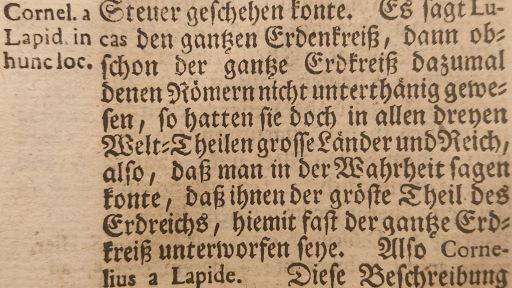
Unfortunately, that is the only book on his "Scripturam Sacram"-sequence [cod_pri_023(a-k)] of that author that I don't own yet, a book called "Commentarii in Quatuor Evangelia". What a pity! Nevertheless: Peikhart mentioned a famous quote on St. Augustine:
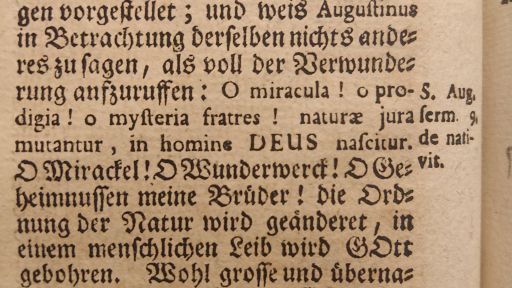
O miracula! o prodigia! o mysteria fratres! naturæ jura mutantur, in homine DEUS nascitur.
Then, I thought I had to make a research on that quote at the original Augustine himself, what he exactly wrote there. I own his "Opera Omnia" in the Paris Edition from about 1650. In its 10th Part of that sequence [cod_pri_079j] i found the original quote at "Sermones de Tempore, In Natali Domini, Sermo IX":
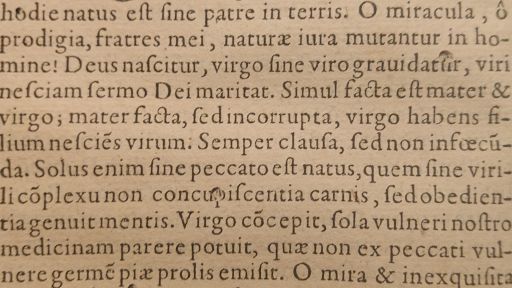
After that, I added that quote to my quote list under [cit_00022]:
O miracula, ô prodigia, fratres mei, naturæ iura mutantur in homine! Deus nascitur, virgo sine viro gravidatur, viri nesciam sermo Dei maritat.
Yet again, another research in my library "Altes Buch". That is whay I collect these books. Making researches like that in your own library is a pleasure to me. Why going to the state library, if you can have that at home?
About the creation of the myth of Pope Joan
When I received a book by Bartolomeo Platina (i.e., Bartolomeo Sacchi), which I bought, I first had to research the author [Wikipedia: Bartolomeo Platina], and there I discovered that in the papal chronicle I had purchased, he made the inaccurate claim that Pope John VIII. was not a man, but a woman in disguise, the so-called Pope Joan. This myth has survived into modern times. It is the subject of numerous novels, stories, and legends surrounding this legendary figure.
So I immediately had to search for the relevant passage in the book. I finally found it on page 64r:
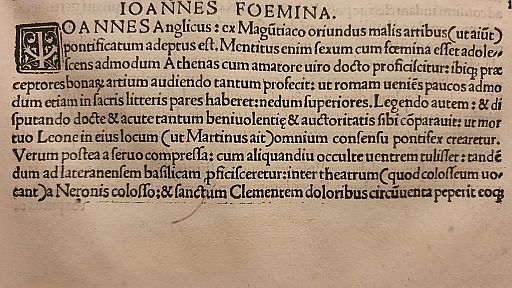
There, Platina writes bluntly of "Ioannes Fœmina," that is, "John the Woman." With the help of Google, I had this passage translated[1]:
JOHN THE WOMAN.
John, of English descent, was born in Maguntiacum (Mainz) and is said to have become pope by evil arts. Disguising herself as a man while a woman, she went to Athens at a young age with her lover, a learned man, and made such great progress in learning under the professors there that when she came to Rome, she met few who could equal her, let alone surpass her, even in the knowledge of the Holy Scriptures. Through her learned and ingenious readings and disputations, she achieved such great respect and authority that, after the death of Pope Leo IV (as Martin says), she was elected pope by consensus in his chamber. When she went to the Lateran Church, between the Colosseum Theater (so named after Nero's Colossus) and the Church of St. Clement, [...]
On Pope Joan's Wikipedia page, I found a quote from Schedel’s World Chronicle (Nuremberg Chronicle):
[DE] Johannes auß engelland erlanget mit bösen künsten das babstthumb. dann wie wol sie ein weipliche person was so wanndert sie doch in gestalt vnnd geperde eins mannßpilds. vnd zohe noch also iung mit irem liebhaber eim gelerten mann gein Athenas. alda wardt sie der schrift also hohgelert das sie gein rom komende wenig ir gleiche in der heilligen schrift het. Nw erlanget sie mit lesen vnd scharpffem disputiren in scheyn eins mans vnder der verborgenheit irer weiplichkeit zu rom solche gutwilligkeit vnd glawbwirdigkeit das sie nach absterben Leonis an sein stat (als martinus spricht) mit allermenigclichs willen zu babst erkorn wardt. Aber sie wardt nachfolgend von eim irer diener geschwengert. vnnd als sie den leib ettwielang getragen het vnd eins tags in sant Johanßen lateranensischen kirchen geen wolt. do wardt sie zwischen der wunderburg vnd sandt Clementen mit ween befangen vnd gepare vnd starb an derselben statt. Ettlich schreiben wenn ein babst zu der benanten sant Johanßen kirchengeen wöll. vnd an dasselb end do das beschehen sey kome. so vermeyde der babst denselben weg in verschmehlicher gedechtnus solcher geschichten: zum andern wenn ein erwelter babst erstlich in sannt Peters. darzu gelöcherten stul gesetzt werdt so pflege der letst dyacon zu vermeyden der gleichen künftiger irrung dem babst seine manliche gepurt glyder durch denselben gelöcherten stul zeberüren.
This is almost word for word the text of Platina, who first published his papal chronicle in 1479, while the "Nuremberg Chronicle" didn't appear until 1493. I purchased a Venice edition of Platina's papal chronicle from 1511. This papal chronicle was placed on the Catholic Church's "Index" in 1580. So fortunate that this book has survived all these centuries and has now found its way to me.
[1] I have reproduced the Google translation of the original source of the Latin Platina text mainly 1 to 1, without making any major changes. Therefore, the text may be somewhat linguistically confusing, but its content gives an idea of what it is about.